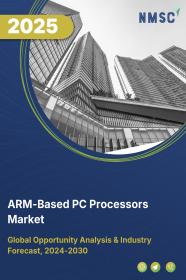
ARM-Based PC Processors Market Size by Component (Hardware, Software, and Services), by Type of IPC (Panel IPC, Rackmount IPC, Box IPC, Embedded IPC, DIN-Rail IPC, and Compact IPC), by Processor Type (32-bit ARM CPU, 64-bit ARM CPU, and Multi-core ARM CPU), by Application (Industrial Automation, Factory Automation, Robotics, and Others), by End-User Industry (Manufacturing, Automotive, Energy & Power, Healthcare, and Others)- Global Opportunity Analysis and Industry Forecast 2024-2030.
US Tariff Impact on ARM-Based PC Processors Market
Trump Tariffs Are Reshaping Global Business
Market Definition
The ARM-Based PC Processors Market was valued at USD 9.20 billion in 2023 and is predicted to reach USD 52.65 billion by 2030 with a CAGR of 28.30% from 2024 to 2030.
ARM-based PC processors are central processing units (CPUs) that are based on the Arm architecture and are used in personal computers (PCs). The Arm architecture is a type of Reduced Instruction Set Computing (RISC) architecture that offers several advantages over traditional x86 processors, including improved power efficiency, lower heat generation, and greater flexibility in design. Arm-based PC processors offer several benefits over traditional x86 processors, including improved power efficiency, longer battery life, and reduced heat generation. They are also more flexible in design, making it easier to create devices with unique form factors and designs.
Market Dynamics and Trends
The rising need for cloud-based services is fueling the demand for ARM-based processors market. Arm processors are well-suited for cloud servers due to their efficient use of power and cost-effectiveness. This makes them a preferred choice for companies looking to enhance their cloud computing capabilities while optimizing costs. As businesses increasingly rely on cloud infrastructure to support their operations, the demand for Arm-based processors is expected to continue growing steadily, driving further market expansion.
Moreover, with the growth of big data and artificial intelligence, there is a growing demand for high-performance computing solutions, which in turn boosts the growth of the market. ARM-based processors are becoming increasingly popular in this space due to their ability to handle complex workloads while consuming less power than traditional x86 processors.
However, the software compatibility associated with the ARM-based PC processors is the major factor restraining the growth of the market. Many software applications are written specifically for x86 processors, and may not work on ARM-based systems without emulation or other workarounds.
This limits the use cases for ARM-based PCs, particularly in enterprise environments where specialized software may be required. On the other hand, the continuous advancements in microarchitecture and the integration of heterogeneous components in ARM-based processors is expected to create lucrative growth opportunities for the market in the future.
These processors are continuously evolving, incorporating innovative microarchitectural designs to enhance performance, energy efficiency, and functionality. Additionally, the trend towards heterogeneous integration, where different types of processing cores and accelerators are combined on a single chip, further enhances the capabilities of Arm-based processors.
Market Segmentation and Scope of Study
The global arm-based PC processors market is segmented on the basis of product type, operating system, application, industry vertical, and geography. Based on product type, the market is classified into high-performance processors, mid-range processors, and low-power processors. Based on the operating system, the market is segmented into windows, macOS, and linux. Based on the application, the market is categorized into smartphones, tablets, laptops, and desktops. Based on the industry vertical, the market is categorized into individual consumer, enterprises, and educational institutions. Geographical breakdown and analysis of each of the aforesaid classifications include regions comprising North America, Europe, Asia-Pacific, and RoW.
Geographical Analysis
Asia Pacific dominated the global arm-based PC processors market and is potently expected to remain dominant in the market throughout the forecast period. This is attributed to the region's rapid technological advancements and increasing adoption of cloud computing and data centers are fueling the need for efficient and high-performance processors.
According to the China Academy of Information and Communications Technology, the cloud computing market in China experienced significant growth in 2022, with a year-on-year expansion of 40.91%, reaching 455 billion yuan (approximately 63.37 billion U.S. dollars).
This growth rate surpassed the global average of 19%, indicating China's robust adoption of cloud services. As businesses and consumers in Asia Pacific embrace digital transformation and increasingly rely on cloud-based services, the need for advanced processors continues to grow, propelling the market forward.
Moreover, the region's growing semiconductor industry and supportive government policies aimed at fostering innovation and digitalization further contribute to the growth of the ARM-based processors market in Asia Pacific. Governments in the region are actively supporting initiatives to enhance technological capabilities and develop advanced semiconductor manufacturing processes.
As per a report from the World Economic Forum as of November 2023, the Japanese government intends to invest approximately USD 13 billion to enhance the domestic semiconductor production system. This conducive environment, combined with the region's robust ecosystem of semiconductor companies and research institutions, is fueling the demand for ARM-based processors as key components in various electronic devices and systems.
North America is projected to exhibit substantial growth in the global arm-based PC processors market owing to the rising online gaming industry in the region. Gamers demand high-performance gaming with fast response times and high refresh rates, and arm-based processors are designed to provide high speed performance which is an important factor for smooth gaming experience.
According to the American Gaming Association (AGA), commercial gaming revenue reached USD 60.42 billion in 2022, which is a 13.9 percent increase over 2021. Also, the presence of leading tech giants and major players such as Nvidia Corporation and Qualcomm Inc. that are adopting various strategies including product launches is further boosting the growth of the market.
For instance, in October 2023, Nvidia and AMD announced to develop their own Arm-based PC chips, aiming to capitalize on the growing demand for ARM-based processors in the PC market by 2025. This strategic move indicates a shift towards ARM architecture, which promises improved performance and energy efficiency compared to traditional x86 processors. By developing their own Arm-based chips, Nvidia and AMD seek to expand their product portfolios and address evolving consumer needs for high-performance computing solutions.
Competitive Landscape
The arm-based PC processors market includes several market players such as Texas Instruments, IMAGO Technologies GmbH, Qualcomm Technologies, Inc., Apple Inc., NVIDIA Corporation, NXP Semiconductors, MYIR Tech Limited, Huawei Technologies Co., Ltd., Microchip Technology Inc., Renesas Electronics Corporation, Marvell Technology, Infineon Technologies, STMicroelectronics, Winmate Inc., Moxa Inc., and others. These market players are adopting various strategies such as partnership and product launch to maintain their dominance in the global arm-based PC processors market.
In February 2024, Samsung Electronics partnered with ARM to develop optimized next-generation Cortex-X CPU using Samsung Foundry's latest GAA process technology. This collaboration aims to enhance the performance and efficiency of ARM-based processors, potentially driving advancements in the ARM-based PC processor market.
In October 2023, Qualcomm launched the Snapdragon X Elite, a high-performance processor designed to meet the demands of next-generation ARM-based PCs. This move highlights Qualcomm's commitment to advancing AI capabilities in mobile computing, potentially revolutionizing the ARM-based PC processor market with enhanced performance and efficiency.
Key Benefits
-
The report provides quantitative analysis and estimations of the arm-based PC processors market from 2024 to 2030, which assists in identifying the prevailing market opportunities.
-
The study comprises a deep dive analysis of the arm-based PC processors market including the current and future trends to depict prevalent investment pockets in the market.
-
Information related to key drivers, restraints, and opportunities and their impact on the arm-based PC processors market is provided in the report.
-
Competitive analysis of the players, along with their market share is provided in the report.
-
SWOT analysis and Porters Five Forces model is elaborated in the study.
-
Value chain analysis in the market study provides a clear picture of roles of stakeholders.
Key Market Segments
By Component
-
Hardware
-
CPU
-
Motherboard
-
Memory
-
Storage
-
Power Supply
-
-
Software
-
Services
By Type of IPC
-
Panel IPC
-
Rackmount IPC
-
Box IPC
-
Embedded IPC
-
DIN-Rail IPC
-
Compact IPC
By Processor Type
-
32-bit ARM CPU
-
64-bit ARM CPU
-
Multi-core ARM CPU
By Application
-
Industrial Automation
-
Factory Automation
-
Robotics
-
Other Application
By End-User Industry
-
Manufacturing
-
Automotive
-
Energy & Power
-
Healthcare
-
Aerospace & Defense
-
Oil & Gas
-
Telecommunication
-
Retail & Hospitality
-
Other End User
By Geography
-
North America
-
The U.S.
-
Canada
-
Mexico
-
-
Europe
-
The UK
-
Germany
-
France
-
Italy
-
Spain
-
Denmark
-
Netherlands
-
Finland
-
Sweden
-
Norway
-
Russia
-
Rest of Europe
-
-
Asia Pacific
-
China
-
Japan
-
India
-
South Korea
-
Australia
-
Indonesia
-
Singapore
-
Taiwan
-
Thailand
-
Rest of Asia Pacific
-
-
RoW
-
Latin America
-
Middle East
-
Africa
-
KEY PLAYERS
-
Texas Instruments
-
IMAGO Technologies GmbH
-
Qualcomm Technologies, Inc.
-
Apple Inc.
-
NVIDIA Corporation
-
NXP Semiconductors
-
MYIR Tech Limited
-
Huawei Technologies Co., Ltd.
-
Microchip Technology Inc.
-
Renesas Electronics Corporation
-
Marvell Technology
-
Infineon Technologies
-
STMicroelectronics
-
Winmate Inc.
-
Moxa Inc.
REPORT SCOPE AND SEGMENTATION:
|
Parameters |
Details |
|
Market Size in 2023 |
USD 9.20 Billion |
|
Revenue Forecast in 2030 |
USD 52.65 Billion |
|
Growth Rate |
CAGR of 28.30% from 2024 to 2030 |
|
Analysis Period |
2023–2030 |
|
Base Year Considered |
2023 |
|
Forecast Period |
2024–2030 |
|
Market Size Estimation |
Billion (USD) |
|
Growth Factors |
|
|
Countries Covered |
28 |
|
Companies Profiled |
15 |
|
Market Share |
Available for 10 companies |
|
Customization Scope |
Free customization (equivalent up to 80 working hours of analysts) after purchase. Addition or alteration to country, regional, and segment scope. |
|
Pricing and Purchase Options |
Avail customized purchase options to meet your exact research needs. |

















 Speak to Our Analyst
Speak to Our Analyst




















